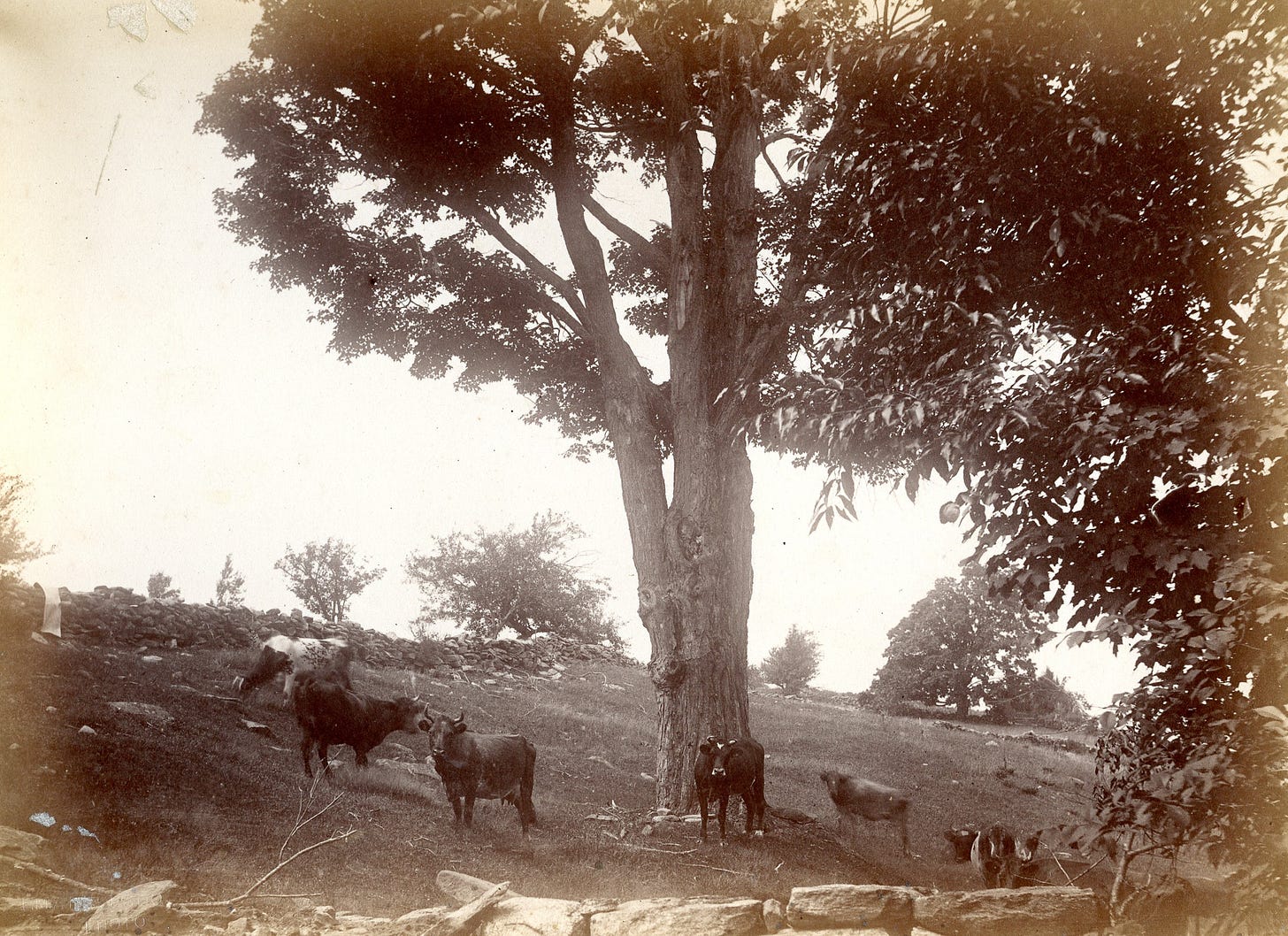Cattle
New Ipswich Historical Society
Cattle
Unknown date and location for photo.
Newspaper Clipping
FEBRUARY 8, 1849 - Letter to the Boston Reporter
For the Boston Reporter.
Origin of the Lines “You’d Scarce Expect, &tc”;
MR. EDITOR.-As I have recently become a subscriber to your valuable paper, I wish to increase its value by correcting any misstatements that appear in its columns, especially the one that comes so immediately under my own personal knowledge as does the one to which I now refer. The article is headed, Hon. Edward Everett. The lines “You’d Scarce Expect, &tc” and their author are so intimately associated with my earliest recollection that I thought I would give a brief history of their origin and author. They were written by David Everett, a native of Massachusetts. Mr. Everett came from Wrentham to New Ipswich Academy, at or about the age of 21; was here in a preparatory course of study co- temporary with Dr. Worcester. And though I was very young, I well remember they were considered rivals in genius and literature. He entered Dartmouth College two years in advance. The winter previous he kept the Grammar School in the center of this town, got up an exhibition in the academic style, and at this time he wrote the lines expressly for, and to be spoken by the writer of this communication, then a little boy about seven years old. Mr. E. graduated in the class of 1795, had the honor of the valedictory poem on that occasion, and entered the practice of law in Boston, Ms., in 1800, having, the year previous, married a daughter of Dea. IsaacAppleton, of this place, and sister of Hon. Samuel and Nathan Appleton, of your city. In the Spring of the year 1813, his health began to fail, and he moved to Marietta, Ohio, where he remained till the Autumn following, when he sank under a pulmonary disease, December 21st., at the age of 44. He was the author of many valuable publications, in which he displayed splendid talents, a prolific imagination, and exalted genius.
The “Lines”were handed to me in manuscript. After they had been given to me, I had always considered them, as in some sense peculiarly belonging to me, to my native State, my native town. When therefore, I saw in the printed copy, the substitution of two words, for two in the original, viz., “Massachusetts”; and “Sister”; for New Hampshire; and Federal; I thought there was either a gross mistake in the printer, or an infringement upon my rights; this changing the place, broke up all my former associations, and entirely destroyed the intrinsic merits of the piece. Whether this was done by the author or not, I am not able to say. I am rather inclined to think the latter was, for he afterwards became a politician of the Jefferson school, edited a paper, called the “Patriot”; and the word Federal became extremely obnoxious to many of that party; this however, I never quarreled much about. But that my native State should receive such an insult, I felt very indignant. It seemed to my youthful heart, to say there was one man who might possibly have some doubts whether New Hampshire could boast as great as any other Federal State, so to end all dispute everywhere, he would put in Massachusetts; but after a residence of several years in the very heart of that State, thus becoming more expatriated from the one and naturalized to the other; and seeing also, that every little boy read the piece just as if it was his own, I gave over the contest, and became reconciled to the change, with this proviso, that, from that time, every boy who should speak the piece, should have the liberty to substitute the name of his own State. The distinguished individual, whose name stands at the head of the article, in your paper, to which I have referred, and to whose pen and genius you attribute these lines, when only seven years old, needs no adventitious aid to brighten his youthful genius, nor false coloring, to give a livid glare to his well-earned fame. His brilliant career is in full view of the public gaze, and justly the theme of public admiration.
I have thus endeavored to set this matter right, not only from the consideration of the fact that the lines are, and for a long time have been familiar to every little boy, and are quoted from, in various parts of our land, but also, that there are many persons now living, who were members of the school, and took a part in the exhibition alluded to, who, I doubt not, would be equally desirous with myself that a correction should be made.
EPHRAIM H. FARRAR.
New Ipswich, N. H., Jan. 27, 1849
James Roger diary entries
9th August 1912
Cloudy and warm wind southerly. David went to Dubois Knight for a short time in forenoon; then cutting grass, etc. at Newcombs’ and Gordons’, also some in cemetery. I cut lots in forenoon and went to Depot for May’s trunk. She came from Depot with Chandler’s auto. Alice and I got out the settees and cleaned Hall for Dance tonight. Mr. Merriam buried in Greenville this afternoon. Mr. Brennan of Peterboro putting up stones in cemetery for Addison Wheeler and Mrs. Woods. Grange closed at midnight. A good turn out at dance.


Would that all children be so guided as to be moved by poetry and literature, whether their consternation seem justified or not.
After reading that clipping, I'm left with same expression as the above cattle. Was the poem that significant or was it because politics crept into the editing of that poem?